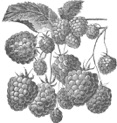Stories


Stories


LOCAL CHOICES ARE GOOD FOR EVERYONE
By REBEKAH DENN
P-I RESTAURANT CRITIC
THANKSGIVING started as a harvest festival, so the idea of an "Eat Local" challenge hardly seems revolutionary.
I was taken aback, then, by comments about P-I stories on the topic and the general "eat local" movement, with some readers practically suggesting the push to try one Washington-grown dish is a "liberal" plot to rob them of canned pumpkin puree; an imposition on our national right to life, liberty and the pursuit of corn subsidies. To me, the challenge is a tame, low-key reminder to know something about what we eat.
Heck, what if King County officials had suggested buying one pesticide-free item for Thanksgiving? Or one item we felt sure could not be the subject of a multistate recall, a la last year's spinach contaminated with E. coli? Or that we should ensure living conditions were bearable for animals that produced just one meat or dairy product for the feast?
"Local" alone doesn't even cover the bases.
It's a simple approach, though, that works partly because it sidesteps the question of money. Eating local and organic and humane can cost more, and the most charged accusation against it is that it's a financial luxury. But for families already planning a holiday feast, choosing a single item that's merely local -- perhaps even mass-produced local products such as Washington apples or onions or potatoes or milk -- doesn't carry the same cost premium. People can enjoy the spirit of the challenge without arguing the politics.
I filled the challenge myself by accident last week when two strangers found empty seats near ours at a dinner at Tilth restaurant, where owner-chef Maria Hines runs a series of talks on sustainability.
It turned out our seatmates were farmers -- George and Eiko Vojkovich -- and I had eaten their eggs, chickens and beef before without ever meeting them in person. They run Skagit River Ranch in Sedro-Woolley, and George was about to speak on the panel along with Brasa chef Tamara Murphy and Gerry Warren of Slow Food Seattle.
When we started chatting about food and gardening with our seatmates (before we were officially introduced), Eiko said, "You should come by the farm!"
I like a place that doesn't worry about people seeing how their animals live. Eiko urged us to make stock from the carcasses after we eat the ranch chickens in our freezer; she'll put broth from her pasture-raised, bug-pecking birds up against the usual supermarket brands we buy.
Hearing details about the couple's priorities and how they fulfill them, it was clear we want the same things: food that tastes great, that is as nutritious and clean as possible, that's good for animals and people and country alike. We were proud to hear their eggs had been sent to a laboratory for a new article in Mother Jones magazine and were proven worth their weight in gold yolk, beating out conventional mass-produced eggs in every nutritional marker tested. We liked hearing that the couple won't ship the ranch's meat, referring interested customers from the East Coast instead to the eatwild.com Web site for closer-to-home producers, who won't burn so much extra oil to get food to their doors.
Mostly, I was touched by Eiko's offhand comment that they will not sell any food they wouldn't feed to their own daughter. It had an effect on me because my own first move on these issues came in 1998, from a New York Times article titled "Playing God in the Garden." In one small detail of the long story, a farmer who regularly sprayed his potato crops with industry-standard pesticides mentioned that he didn't let his own family eat the potatoes he sold to distributors. Instead, the farmer kept a small organic plot for home cooking.
The impact of that throwaway comment has stuck with me all these years, the feeling that if the farmer's crop wasn't safe enough for his own kids, it wasn't safe for mine.
In contrast to the details of the Vojkovichs' story, when I asked QFC for foods that would fulfill the "Eat Local" pledge, the list included store-brand eggs "from Arlington." I'm not picking on QFC -- they have some great choices for people looking to eat local, and I listed some in today's cover story, including the well-documented Wilcox-brand organic eggs -- but I had to inquire where in Arlington those store-brand eggs were from. By deadline, I still hadn't received a response.
I'll stay away, because I've been wary of where my eggs come from since a 2001 Snohomish County case involving a horror scene of an egg farm. The unease didn't come from the P-I story describing "ghoulish" heaps of dead chickens and starving birds cannibalizing each other. I know that's not the norm. The problem was the fallout, where county officials tried to research how far the farm's general practices were from industry standards. They weren't far enough for my comfort. Standards have improved, but still not enough for me to abdicate my responsibility to know something about the birds.
Americans don't believe they have time to think so much about their food, the Vojkovichs pointed out when we were talking about the ranch hens.
But for the ranch owners, it's different. "We look at food as medicine," said George. "Our diet is related to our health, and we've got to recognize that."
The birds laying for QFC might be pecking as happily for bugs at this Arlington farm as they do at Skagit River Ranch for all I know -- but I do want to know. That's why I have two dozen of the ranch's eggs in my refrigerator, and why by the evening's end at Tilth I had ordered my Thanksgiving turkey from George and Eiko.
When we pick it up Sunday, it will cost more per pound than we would have paid for our usual anonymous supermarket bird. We wouldn't spend the money every day, but we only make Thanksgiving dinner once a year. It's year-round that we're thankful for the Washington farmland supported by the "eat local" challenge, and thankful we still have so many choices here about what goes on our table.
Regional
Seasonal
Sustainable
Convivial

